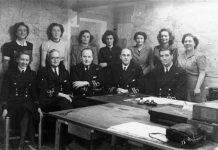Today is Sunday, April 17, the 108th day of 2015. There are 258 days left in the year.
Highlights in history on this date:
1194 – Richard the Lionhearted returns to England, ending an epic journey which began with his victory over Muslim leader Saladin during the Third Crusade.
1492 – Spain agrees to finance Christopher Columbus’ voyage of discovery; Columbus signs a contract with a representative of King Ferdinand and Queen Isabella, giving him a commission to seek a westward ocean passage to Asia.

1521 – Martin Luther appears before the Holy Roman Emperor at Worms, Germany, and is cross-examined about his thoughts on religious reform. Luther goes into hiding soon after.
1524 – Giovanni da Verrazano discovers New York harbor.
1824 – Russia and the United States define respective rights in the Pacific Ocean and on northwest coast of America.
1895 – China and Japan, by Treaty of Shimonoseki, recognize independence of Korea; China opens seven new ports and cedes Formosa (Taiwan), Port Arthur and the Liao Tung Peninsula to Japan.
1943 – U.S. bombers attack Palermo, Sicily, in World War II.
1946 – Last French troops leave Syria, which becomes independent.
1961 – Cuba is invaded at “Bay of Pigs” by a U.S. supported invasion force of 1,500 Cuban exiles, who are defeated by Fidel Castro’s forces.
1964 – The Ford Motor Co. unveils its new Mustang model; Jerrie Mock of Columbus, Ohio, becomes the first woman to complete a solo airplane flight around the world.
1969 – Czechoslovak Communist Party chairman Alexander Dubcek, a reformer, is deposed.
1971 – Egypt, Syria and Libya sign agreement to confederate.
1975 – Phnom Penh falls to communist insurgents, ending Cambodia’s five-year war.
1989 – Afghan government forces dislodge rebels from major land routes.
1992 – Russian lawmakers refuse to approve arms control pact, setting up another confrontation with President Boris Yeltsin.
1993 – A federal jury in Los Angeles convicts two former police officers of violating the civil rights of beaten motorist Rodney King; two other officers are acquitted.
1994 – Serb tanks enter Gorazde, Bosnia, after U.N. officials announce an agreement to end the siege of the Muslim enclave.
1995 – Turkey announces it has started to withdraw some of the 35,000 troops it sent into northern Iraq to fight Kurdish guerrillas.
1997 – The South Korean Supreme Court upholds verdicts sentencing former president Chun Doo Hwan to life in prison and his successor, Roh Tae Woo, to 17 years. They were accused of abuse of power and corruption.
1998 – The United Nations withdraws the team investigating mass killings of Rwandan Hutus in Congo, complaining of a “total lack of cooperation” by the Congolese government.
1999 – The Indian nationalist coalition government of Prime Minister Atal Bihari Vajpayee resigns after a vote of no confidence in parliament.
2000 – Paul Kagame is selected president of Rwanda, the nation’s first Tutsi leader since independence in 1962 and a former rebel leader whose forces stopped the 1994 genocide.
2001 – Jury selection begins in Brussels in the landmark trial of four Rwandans, including two Roman Catholic nuns, who face charges of aiding and abetting the murder of Tutsis during the 1994 genocide.
2005 – Communist rebels in southern Nepal drag at least 10 people from their homes and gun them down for refusing to take up arms with the guerrilla movement. The guerrillas, who claim to be inspired by Chinese revolutionary Mao Zedong, began fighting in 1996 to overthrow Nepal’s monarchy and establish a communist state.
2006 – A Palestinian suicide bomber blows himself up outside a fast-food restaurant in a bustling area of Tel Aviv during the Passover holiday, killing nine other people and wounding dozens in the deadliest Palestinian attack in more than a year.
2008 – A suicide bomber strikes the funeral of two anti-al-Qaida Sunni tribesmen in a town north of Baghdad, killing at least 50 people and wounding dozens.
2010 – Some 100,000 Poles fill Warsaw’s biggest public square, joining together for a memorial and funeral Mass for the 96 people, including President Lech Kaczynski and his wife, killed in a plane crash in Russia a week earlier.
2011 – The operator of Japan’s crippled nuclear plant lays out a blueprint for stopping radiation leaks and stabilizing damaged reactors within the next six to nine months as a first step toward allowing some of the tens of thousands of evacuees to return to the area.
2012 – In a scene unimaginable in many countries, Norway’s worst mass killer gets the chance to explain his fanatical views to the court and the world, unrepentant and dressed in a business suit. Prosecutors and lawyers for the families of his 77 victims even shake his hand.
2013 – Syrian President Bashar Assad accuses the West of backing al-Qaida in his country’s civil war and warns it will pay a price “in the heart” of Europe and the United States as the terror network becomes emboldened.
2014 — Nobel laureate Gabriel Garcia Marquez, the Colombian writer who helped define Latin America, dies at his home in Mexico City at age 87.
2015 – Cardinal Francis George, a vigorous defender of Roman Catholic orthodoxy who played a key role in the church’s response to the clergy sex abuse scandal, dies at age 78.
Today’s Birthdays:
Henry Vaughan, English poet (1622-1695); Samuel Chase, U.S. jurist/signer of the Declaration of Independence (1741-1811); J. Pierpont Morgan, U.S. financier (1837-1913); Isak Dinesen, Danish writer (1885-1962); Thornton Wilder, U.S. novelist/playwright (1897-1975); Nikita Khrushchev, Soviet statesman (1894-1971); Liz Phair, U.S. singer (1967–); Jennifer Garner, U.S. actress (1972–); Victoria Adams Beckham, British singer/fashion designer (1974–).
Thought For Today:
Many of life’s failures are people who did not realize how close they were to success when they gave up. — Thomas Edison (1847-1931), U.S. inventor.
Copyright 2016 The Associated Press. All rights reserved. This material may not be published, broadcast, rewritten or redistributed.




